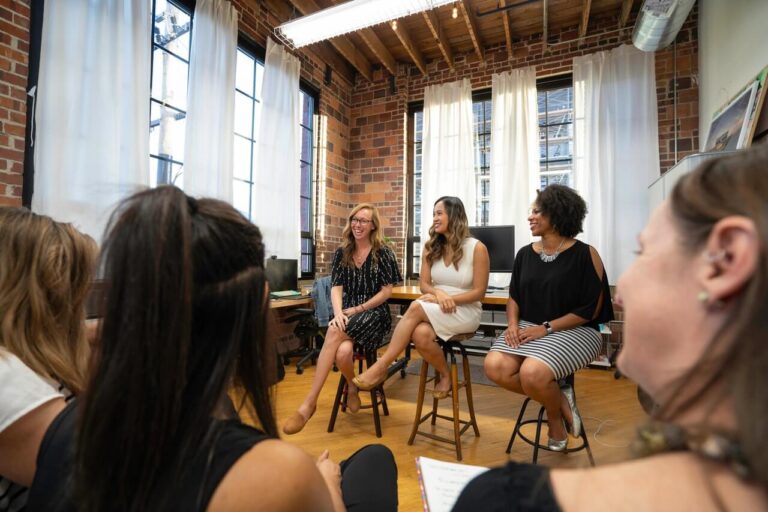Blog >> Engage Communities through Group Poems
Engage Communities through Group Poems
Writing a poem with a group of people encourages individuals to share their thoughts, feelings, and experiences, and work together to assemble their writing into one unified voice. At writing experts who support thought-leading organizations in the non-profit, public and private sectors, we use group poems to creatively connect local government entities and business professionals with community members. We also perform this as a team-building exercise during our creative content strategy sessions. If you are building your organization’s content marketing strategy or looking for creative team exercises that build community and connect people across disciplines and industries, you should definitely use this exercise. If you’re ready to take your work to the next level, learn more about our services at Untold Content!
How to Write a Group Poem
- Gather a group together in a circle and introduce a broad theme on which to write.
- Read an example poem on this theme aloud to the group.
- Ask the group to write independently on the theme for 10-15 minutes.
- Go around the circle and ask participants to share their individual poems.
- As we share, we all write down our favorite lines from other group member’s narratives.
- Once everyone has read their work aloud, open up the group and ask everyone to say aloud their favorite lines from other people’s poems. Let voices ring out in an organic, overlapping style.
- Ask each person to select their favorite line from their poem and write it on a white board, chalk board, or just write line on a small piece of paper.
- Work together as a group to combine and arrange every person’s line into a unified poem that creates new meaning and encourages community connection.
Why Write Group Poems
Indigenous writer and scholar Linda Tuhiwai Smith (2012) argues that without the literacy performances of storytelling, remembering, connecting, creating, and sharing, communities can turn inward and “let their suffering give way to a desire to be dead.” Such desires often stem from a people’s weariness of both economic suffering and cultural disrespect. Rather than allowing such hardships to destroy our communities, however, group poems and story circles keep communities alive and connected in spite of struggle. Whether you work directly to bridge gaps between community members, or manage a team within a non-profit or business that needs to connect, the group poem writing process encourages people to listen carefully to each other’s stories and find connections in their experiences through words.
Example Group Poem
Each line of the following poem, called “What I Carry” was written by a different person. We culled together our favorite lines from our individual “What I Carry” poems and created the following group poem:
What I Carry
I carry the love I have for my family
even when things aren’t right with us.
I carry thinking of my mom,
how she did things with me.
I carry her small body and weakness,
times ten when I look at my children.
I carry my children to a happier life,
Up, happy, in a good mood—
I share things with my children.
I carry my tears, cascading down a rocky cliff,
to write down the feelings,
to be a role model and lead by example,
and follow through.
Who knew poems could weigh so much?
In the beginning, I had to get over the past, and I did—
protecting myself and my dignity.
I carry everything I’m meant to carry,
taped up tight, collected into each other.
I have no choice but to carry it.
Our Results from Hosting Group Poetry Workshops
At Untold Content, we’ve used this technique to unite folks living in poverty around Cincinnati. We volunteered for several years in one of Cincinnati’s Urban Appalachian neighborhoods as writing instructors and learned first-hand that group poems can encourage deep listening and community connection.
Among one group of adult G.E.D. students, participants wrote a group poem about their homes. Through the exercise, we all heard about troubling apartment living conditions, and in response, we worked together to write a landlord complaint letter that resulted in a resolution to a mice infestation. During another group poetry workshop we held on the topic of “Memory,” a woman living with her four young children in an Urban Appalachian neighborhood wrote about the very recent murder of her husband. Another man wrote about his experience overcoming an alcohol addiction that kept him from being a better father.
Turning such stories into group poems, we wrote that we are from “southern folks who had not much/but all they needed.” We said that “everywhere I go is home to me now” and that “home is where my heart is/not brick/not mortar/nor stone”—where raising our children “takes a village.” We wrote of “highways dividing up neighborhoods/making it seem like there’s no difference between them.” We dreamed of safe places where “people who wanna get clean can feel safe/so they, too, can have a chance to be successful.”
What Participants Say about the Group Poem Experience
- One Urban Appalachian woman explained that: “It’s been ten years since I let out my emotions. It was hard for me to process all of the stuff going on in my community. I felt like I needed therapy or something! But sitting here now and writing really helps me feel better and get out those emotions. This is such a blessing, you know?”
- An African American woman who had recently migrated to Cincinnati from the Appalachian city of Pittsburgh, shared similar thoughts during an individual interview with me: “Writing is like therapy for me. It helps me cope. All the things I’ve been feeling in the past year [pause] I can get it down. When I get home, I get out my laptop, listen to beats, and write to it. It kills time, so I know I love it. It helps me from stressing and crying and worrying about money and everything else.”
- As another Urban Appalachian woman, Cathy explained, “Writing helps me heal and share with others too.”
The writers participating in group poetry workshops will likely all come from diverse backgrounds, and although we won’t share a common (indigenous) heritage, our struggles and reflections are powerful when they are connected through the act of composing. We encourage you to try this group poem exercise within your communities to inspire connection, empathy, and understanding.
References
Linda Tuhiwai Smith, Decolonizing Methodologies: Research and Indigenous Peoples (Lillington: Edwards Brothers Inc., 2012), 147.
Want to engage in similar creative writing exercises with the Untold team? Explore our services!




